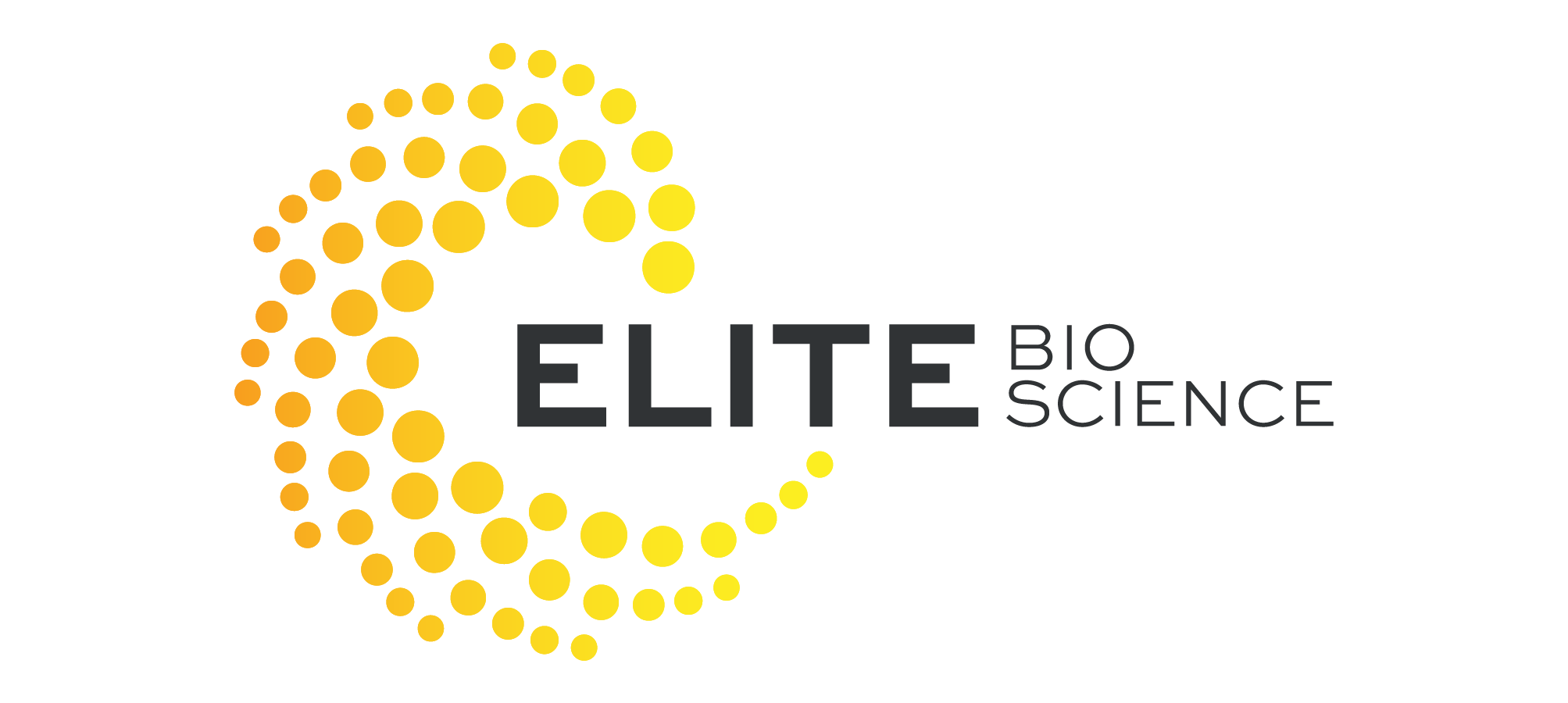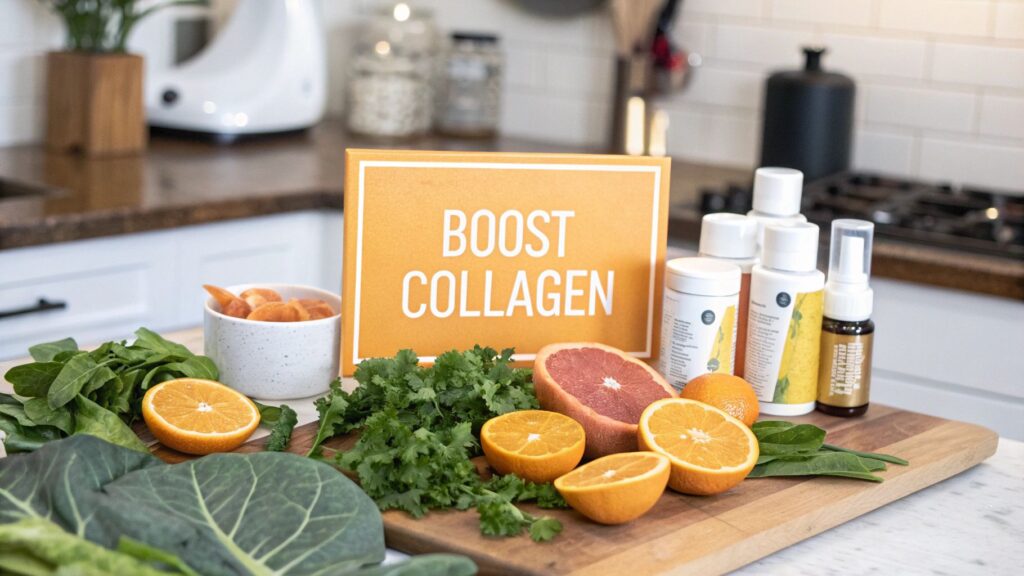To get your body to make more collagen on its own, you really have to tackle it from two angles: you need to feed your body the right building blocks and you have to protect the collagen you’ve already got. This means loading up on nutrients like vitamin C, amino acids, and minerals, while also keeping an eye on lifestyle habits like sun exposure and stress. Think of it as a simple "fuel and protect" strategy.
Understanding How Your Body Builds Collagen
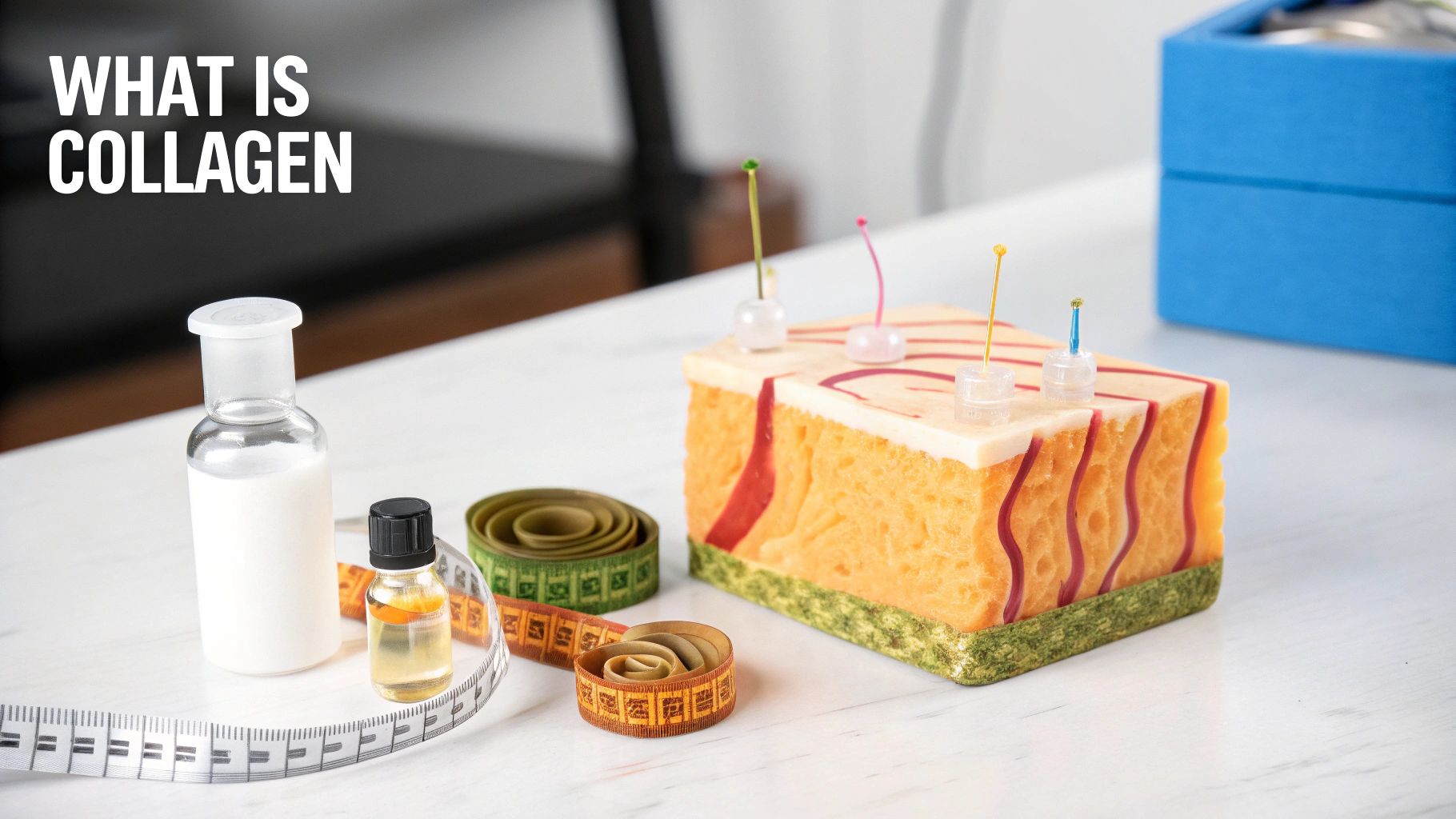
Before we jump into the "how-to," it helps to know what’s actually happening inside your body. Collagen is the most plentiful protein we have, acting as the main structural framework for our skin, bones, muscles, and all the connective tissues in between. It’s basically the "scaffolding" that gives everything strength and elasticity.
Your body has specialized cells called fibroblasts that are responsible for pumping out collagen. But here's the catch: that production starts to drop by about 1% per year once you hit your mid-to-late 20s. This natural slowdown is a huge reason we start to see the classic signs of aging, like fine lines, wrinkles, and skin that just isn't as firm as it used to be.
The Science of Collagen Synthesis
Making new collagen isn’t as simple as just eating it. Your body needs a specific set of raw materials to construct the strong, triple-helix structure that gives collagen its impressive strength. The most critical ingredients are:
- Amino Acids: Proline, glycine, and hydroxyproline are the fundamental building blocks. You can't build the structure without them.
- Vitamin C: This is an essential co-factor. Without enough vitamin C, the whole synthesis process grinds to a halt.
- Zinc and Copper: These minerals are key supporting players, helping out in different stages of the production cycle.
When you look at it on a molecular level, you can see just how intricate the design is—it gives our skin its resilience and bounce. When that structure weakens, signs of aging start to show up. This is exactly why flooding your system with the right nutrients is so critical for keeping your skin looking youthful.
This is also where more advanced strategies, like using peptides for skin rejuvenation, come into play. They can directly supply the precise amino acid sequences your body needs to get the job done more efficiently.
It’s no surprise that consumer interest has exploded as people have become more aware of this process. The global collagen supplement market was valued at a whopping USD 6.86 billion in 2024, with over 40% of sales coming from nutraceuticals.
Build Youthful Skin from Your Kitchen
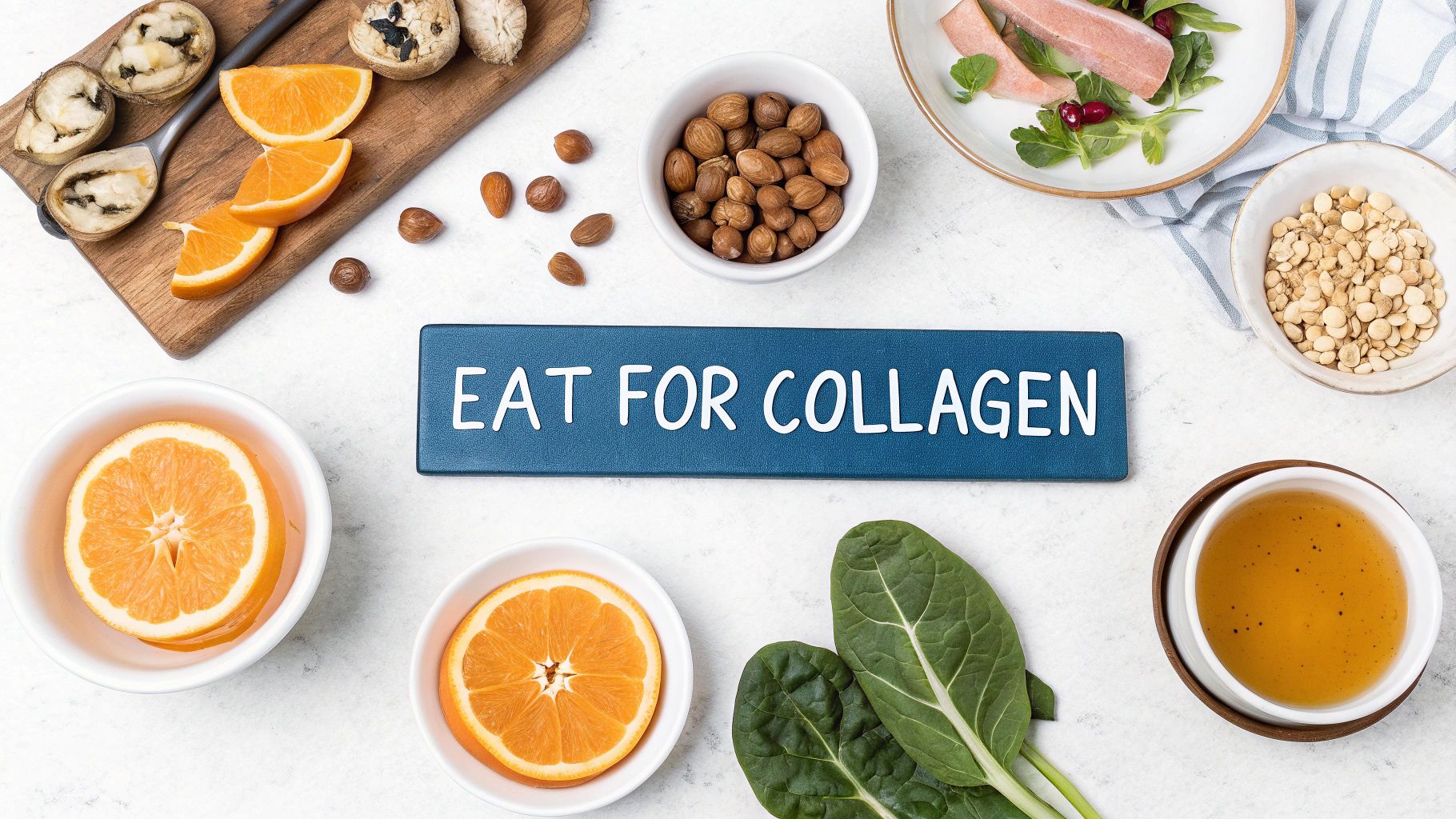
While supplements and fancy creams have their place, the most powerful tool you have for boosting collagen is right in your kitchen. Your diet is the foundation.
Think of your body like a high-tech factory. To manufacture strong, healthy collagen, you have to supply it with the right raw materials. Without them, the production line grinds to a halt, no matter what else you’re doing.
This means getting strategic with your meals and focusing on the specific vitamins, minerals, and amino acids that are non-negotiable for collagen synthesis. It’s about building youthful skin from the inside out, one bite at a time.
The Essential Collagen Building Blocks
To weave together new collagen fibers, your body needs a team of key nutrients working in perfect harmony. The absolute cornerstones are the amino acids proline and glycine, which form the very backbone of the collagen helix. You'll find these in abundance in any quality protein source.
But the amino acids can't do the job alone. They rely on a few critical helpers—or co-factors—to get the job done.
- Vitamin C: This is the MVP of collagen production. It acts like a switch, turning on the enzymes that stabilize and structure new collagen fibers. Without it, the whole process falls apart.
- Zinc: This mineral is a multitasker, helping your body both produce new collagen and repair damaged skin tissue.
- Copper: Essential for the final, crucial step. Copper helps form the strong cross-links that give collagen its resilience and strength.
If you’re consistently low on any of these four components—proline, glycine, vitamin C, or key minerals—your body's ability to build and maintain its collagen network is seriously hobbled. This is why a targeted, nutrient-dense diet is your absolute first line of defense against premature aging.
Key Takeaway: Your diet isn't just about general health; it's about providing the exact building blocks for your skin's structure. Prioritizing foods rich in amino acids, vitamin C, zinc, and copper gives your body the direct fuel it needs for optimal collagen synthesis.
Crafting a Collagen-Boosting Meal Plan
Putting this into practice is way simpler than it sounds. It’s all about making small, consistent choices that add up. For example, you could start your day with a smoothie loaded with spinach (vitamin C), Greek yogurt (proline and glycine), and a handful of pumpkin seeds (zinc).
For lunch, think about a big salad topped with grilled chicken or chickpeas for the amino acids, then toss in plenty of bell peppers and tomatoes for a serious hit of vitamin C. This nutrient-pairing strategy ensures your body gets everything it needs at once.
Many people also swear by incorporating bone broth into their weekly routine, as it’s a fantastic, bioavailable source of collagen and amino acids. For a deeper dive into how specific vitamins directly impact your skin, check out our guide on the best vitamins for glowing skin.
The power of vitamin C, in particular, can't be overstated. Research has directly linked higher vitamin C intake with better skin appearance. One study found that women who consumed at least 100 mg of vitamin C daily had up to 11% less skin wrinkling compared to those getting less than 50 mg. While the official RDA is 75–90 mg, many experts suggest aiming for 200–400 mg daily for optimal skin support.
To make this even easier, here’s a quick-reference table of the best foods to add to your grocery list.
Top Foods for Natural Collagen Synthesis
| Nutrient | Role in Collagen Production | Excellent Food Sources |
|---|---|---|
| Proline & Glycine | The core amino acid building blocks of the collagen helix. | Bone broth, gelatin, chicken skin, pork skin, fish, eggs, dairy, beans, and legumes. |
| Vitamin C | Activates enzymes that stabilize and link collagen fibers. | Citrus fruits (oranges, lemons), bell peppers, strawberries, kiwi, broccoli, and kale. |
| Zinc | Acts as a co-factor in collagen production and aids in skin repair. | Oysters, red meat, poultry, beans, nuts (cashews, almonds), and pumpkin seeds. |
| Copper | Helps form the strong cross-links that give collagen its durability. | Shellfish, nuts and seeds, whole grains, organ meats (liver), and dark chocolate. |
Think of this table as your cheat sheet for building a collagen-friendly plate at every meal.
The Collagen Killers to Avoid in Your Diet
Just as important as what you add to your diet is what you limit or avoid. Some foods actively sabotage your efforts by damaging existing collagen and slowing down new production.
The number one enemy here is excess sugar.
When you eat too much sugar, it triggers a destructive process called glycation. In simple terms, sugar molecules attach themselves to proteins like collagen, creating nasty compounds called advanced glycation end products (AGEs).
These AGEs make your flexible, bouncy collagen fibers turn rigid, brittle, and weak. The result? Sagging skin and wrinkles. A diet loaded with refined carbs and sugary drinks is one of the quickest ways to accelerate the aging process. By cutting back on processed junk, you’re not just helping your overall health—you’re actively protecting your precious collagen reserves from damage.
Lifestyle Choices That Protect Your Collagen
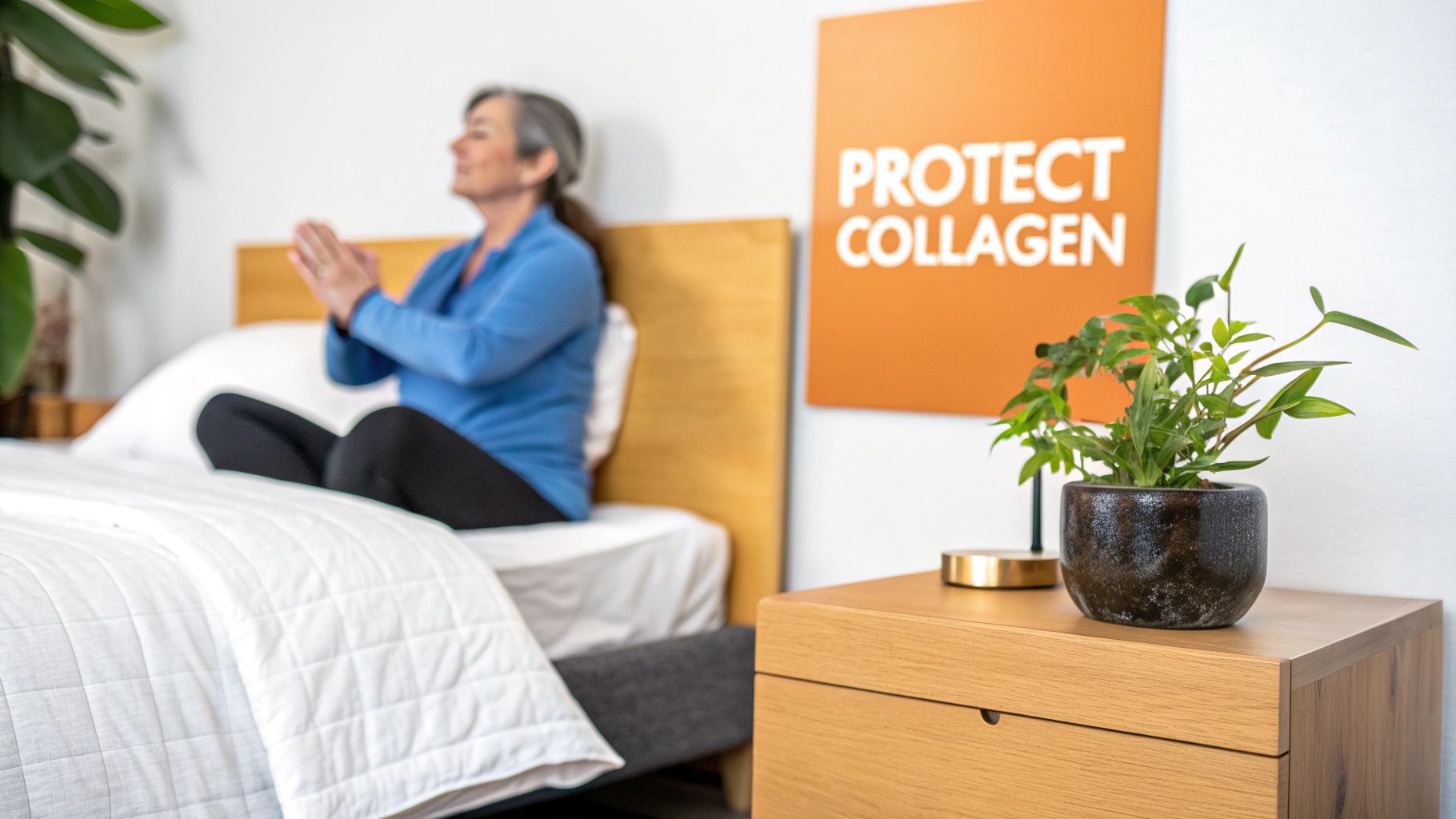
While a nutrient-rich diet gives you the raw materials for collagen, your daily habits are what truly dictate how well your body can put them to use. Some lifestyle choices actively protect the collagen you already have, while others can tear it down faster than you can possibly rebuild it.
Getting a handle on these factors is a non-negotiable part of any serious collagen-boosting strategy.
One of the biggest culprits here is chronic stress. When you're constantly frazzled, your body is swimming in a hormone called cortisol. While it’s useful in short bursts, persistently high cortisol is destructive to your skin. It directly triggers the breakdown of collagen and elastin fibers, which is why a stressful period can leave your skin looking dull and feeling less firm.
Manage Stress to Preserve Your Skin
Finding effective ways to manage stress isn't just about feeling better mentally; it's a physical necessity for healthy skin. The goal is to get your cortisol levels down, giving your body a chance to repair and rebuild.
This doesn't mean you need a complete life overhaul. Small, consistent practices can make a huge difference.
Try weaving one or two of these into your daily routine:
- Mindful Breathing: Just five minutes of slow, deep breathing can significantly lower cortisol. Try a simple "box breathing" exercise—inhale for four counts, hold for four, exhale for four, and hold for four again.
- Light Exercise: A brisk walk, a gentle yoga session, or even just a few minutes of stretching helps your body process stress hormones. It also boosts circulation, delivering vital nutrients right to your skin cells.
- Journaling: Spending 10 minutes writing down your thoughts before bed can help clear your mind. This often leads to better sleep and lower stress when you wake up.
The key is to find what works for you and treat it like preventative skincare.
Prioritize Restorative Sleep
Sleep is when your body's repair crew really gets to work. During the deep stages of sleep, your body releases human growth hormone (HGH), which plays a huge role in repairing damaged tissues and kicking off collagen synthesis. Skimping on sleep literally robs your skin of this critical renewal time.
Consistently getting 7 to 9 hours of quality sleep is one of the most powerful things you can do to boost collagen naturally. If you struggle with sleep, simple changes like creating a cool, dark environment and ditching screens an hour before bed can dramatically improve your sleep quality.
Your body performs most of its collagen repair and regeneration overnight. Treating quality sleep as a non-negotiable part of your skincare routine is essential for seeing real, lasting results in your skin's firmness and texture.
Defend Against Environmental Damage
Beyond internal factors like stress, external aggressors pose a constant threat to your collagen. Sun exposure and smoking are two of the absolute worst offenders.
UV Radiation: The sun's UV rays are collagen's number one enemy. They penetrate the skin and cause oxidative stress, leading to a rapid breakdown of collagen fibers. This damage, known as photoaging, is responsible for up to 80% of the visible signs of aging, like deep wrinkles and sagging.
Making a broad-spectrum sunscreen with at least SPF 30 a daily habit is the single most important thing you can do to protect your collagen. Apply it every single morning—rain or shine, even if you’re staying indoors.
Smoking: This habit is absolutely devastating for your skin. The thousands of chemicals in cigarette smoke constrict your blood vessels, starving your skin of the oxygen and nutrients it needs to repair itself. It also generates a flood of free radicals that directly attack and destroy collagen and elastin, accelerating wrinkle formation, especially around the mouth. Quitting is a powerful step toward preserving your skin's youthful structure.
How Exercise Can Rebuild Your Skin's Firmness
We usually think of exercise for toning muscle and keeping our hearts healthy, but its benefits go much deeper—right down to the structure of your skin. Physical activity is a fantastic and completely natural way to kickstart collagen synthesis, helping to rebuild that firm, youthful feel from the inside out.
When you get your body moving, you're doing more than just burning calories. You're actually sending a powerful signal to your body to repair and strengthen all of its connective tissues.
This works in a couple of key ways. First off, exercise gets your blood pumping, dramatically boosting circulation. Think of this increased blood flow as a high-speed delivery service, rushing oxygen and essential nutrients—like the amino acids and vitamins we've been talking about—straight to your skin cells. When your fibroblasts (the skin's collagen factories) are well-nourished, they can operate at their absolute best.
Resistance Training: The Key to Firmer Skin
While any kind of movement is a plus, resistance training is in a league of its own when it comes to revving up collagen production. When you challenge your muscles with weightlifting, Pilates, or even bodyweight exercises like yoga, you create tiny micro-tears in both the muscle and its surrounding connective tissues.
This is a good thing! Your body’s natural healing response is to not only repair this tissue but to build it back stronger and more resilient than it was before. This repair process demands a huge ramp-up in collagen synthesis. It’s the very same mechanism that fortifies your tendons and also supports the dermal layer of your skin, giving you a firmer, more toned look. The mechanical stress from a good workout directly tells your cells to build back stronger.
A strong, active body and firm, resilient skin are directly linked. The physical stress from a good workout prompts your body to build a more robust collagen network, improving elasticity and strength.
Making Exercise a Consistent Habit
To see real, lasting benefits, consistency trumps intensity every time. You don't need to train like a pro athlete. The goal is to find a balanced routine that you can actually stick with.
Just integrating a few sessions of resistance training into your week can make a noticeable difference over time.
Here are a few effective options to consider:
- Weightlifting: Big compound movements like squats, deadlifts, and bench presses create a systemic response that boosts growth factors throughout your entire body.
- Pilates: This method focuses on controlled movements and core strength, placing sustained tension on both muscles and connective tissues.
- Yoga: Many poses, especially those that involve holds and balances, are a fantastic form of bodyweight resistance training. As a bonus, yoga also helps lower stress hormones like cortisol, which are known to break down collagen.
The link between working out and collagen isn't just a theory. Research has shown that older adults who started moderate resistance training for just 12 weeks increased their collagen synthesis rates by up to 50%.
The World Health Organization's recommendation of at least 150 minutes of moderate activity per week is a great baseline that supports both heart health and this vital skin-rebuilding process. You can explore more strategies for improving skin elasticity in our detailed guide.
Skincare Ingredients That Support Collagen
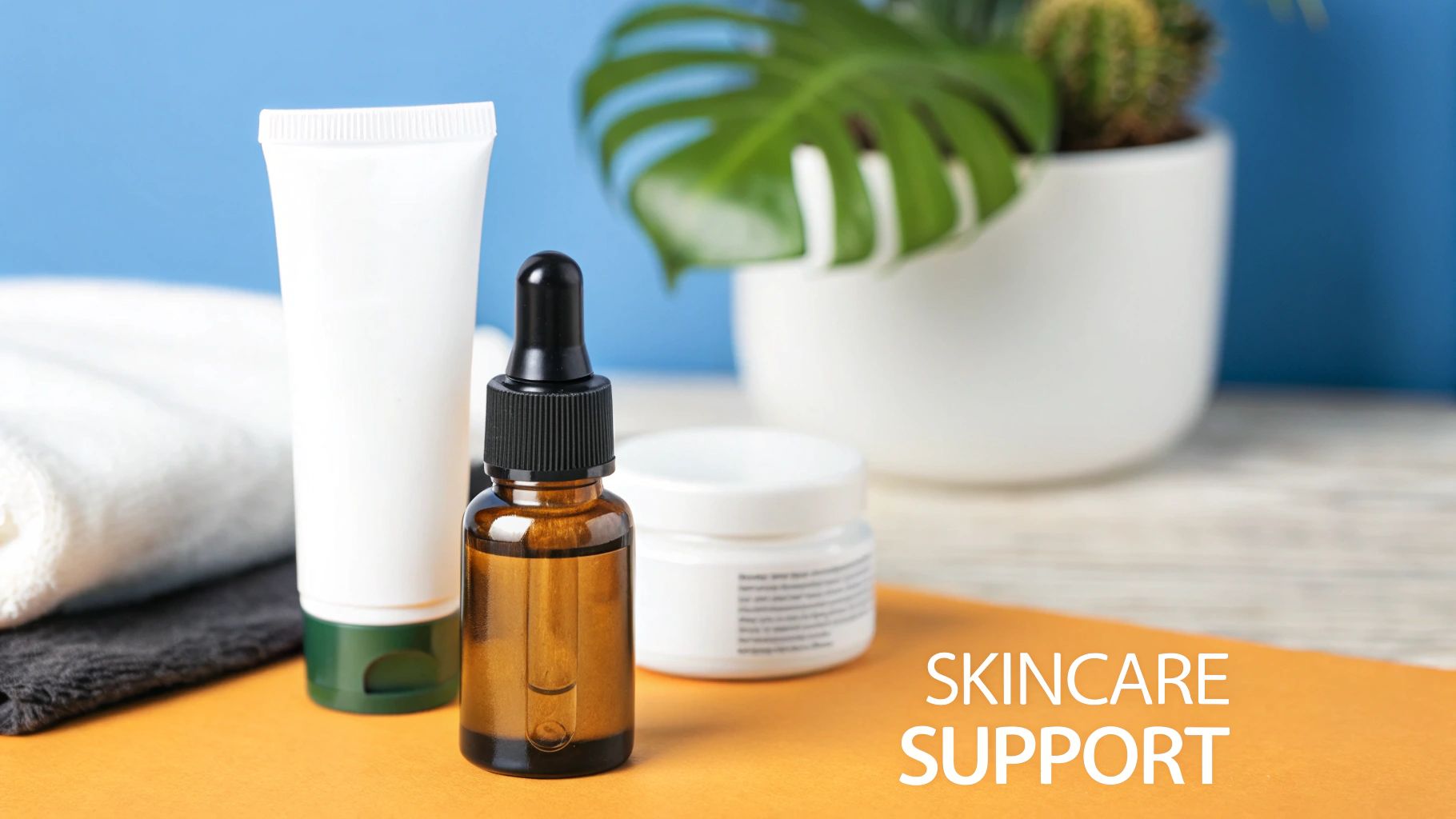
While building healthy skin from the inside out is the foundation, a smart topical routine gives you some powerful external backup. Walking down the skincare aisle can feel like a guessing game, but a handful of key ingredients have been proven time and again to kick your skin's collagen production into a higher gear.
Think of your skincare routine as sending direct messages to your skin cells. When you apply the right ingredients, you’re essentially telling your fibroblasts—the tiny collagen factories in your skin—to wake up and get back to work. Weaving these into your daily habits can make a real, visible difference.
The Power Players in Topical Skincare
A few ingredients are true heavyweights when it comes to influencing collagen synthesis. If you're looking for products that actually deliver, these are the names you want to see on the label.
Retinoids (Vitamin A): This is the undisputed gold standard in anti-aging skincare, and for good reason. Retinoids, which include both prescription-strength tretinoin and over-the-counter retinol, work by speeding up skin cell turnover while directly stimulating those fibroblast cells. If you're new to retinoids, start slow with a low-concentration formula (around 0.25% retinol) just two or three nights a week to let your skin adjust.
Vitamin C: An absolute must-have antioxidant, Vitamin C is a critical co-factor for collagen synthesis. Using it topically helps shield your existing collagen from free radical damage and signals your skin to produce more. The sweet spot is a serum with L-ascorbic acid in a concentration between 10-20%, which gives you the best stability and punch.
Peptides: These are small but mighty chains of amino acids that act like messengers, telling your skin cells what to do. Certain types, like copper peptides or Matrixyl, send specific signals to build more collagen and elastin. Over time, this helps firm up the skin and soften the look of fine lines.
Using these ingredients together gives you a multi-pronged attack on collagen loss, working from the outside in.
How to Build an Effective Routine
Getting the most out of these powerhouses means layering them correctly to maximize their benefits without causing irritation. A simple, effective strategy is to apply your Vitamin C serum in the morning. This lets you take full advantage of its antioxidant powers to protect your skin from daily environmental attacks like UV rays and pollution.
Save your retinoid for your nighttime routine, since it can make your skin more sensitive to sunlight. Peptides are generally gentle giants and can be used morning or night. You'll often find them in moisturizers or dedicated serums that layer nicely with other products.
Pro Tip: When layering products, always go from the thinnest consistency to the thickest. A great rule of thumb is: cleanser, toner (if you use one), serum, then moisturizer. In the morning, sunscreen is always your final step.
For those with sensitive skin who find retinoids a bit too much, bakuchiol has become a fantastic plant-based alternative. Studies are showing it can deliver similar collagen-boosting results without the redness and peeling that sometimes come with retinoids.
And don't forget the simple power of facial massage. Gently massaging your skin as you apply your products isn't just relaxing—it boosts circulation, which brings more oxygen and nutrients to your skin cells, supporting their natural ability to regenerate.
Of course. Here is the rewritten section, crafted to sound completely human-written and natural, following all your requirements.
Got Questions About Boosting Collagen? Let's Clear a Few Things Up.
So, you're ready to start helping your body make more collagen naturally. That's fantastic. But as you get into it, you'll probably have a few questions pop into your head. That's totally normal. Let's tackle some of the most common ones so you can move forward with confidence.
Probably the biggest question I hear is, "How long will this actually take?" When you're using natural methods like food and lifestyle changes, you have to play the long game. It usually takes a solid 4 to 12 weeks of being consistent before you start seeing real, noticeable changes in your skin's firmness and texture. Skin cell turnover and collagen rebuilding don't happen overnight, so the key is to build habits you can stick with, not to look for a quick fix.
What About Plant-Based Diets and Supplements?
Another point of confusion is often around vegan collagen. Let's be clear: true collagen only comes from animal sources. But that doesn't mean "vegan collagen boosters" are useless—far from it. These products are actually incredibly smart. They don't contain collagen itself, but they're loaded with the essential building blocks your body needs to produce its own, like vitamin C, zinc, and specific amino acids from plants. They work by giving your internal collagen factory all the raw materials it needs to run smoothly.
This leads to the next big question: can't you just take a supplement instead of overhauling your diet?
While collagen supplements are great for delivering a concentrated dose of those key amino acids, they work best as part of a team. Your body still needs co-factors like Vitamin C to actually assemble those amino acids into new collagen fibers.
Think of supplements as a powerful booster, not a magic bullet. They can definitely amplify your results, but they can't fully compensate for a diet that's missing the crucial vitamins and minerals your body needs. The winning strategy is always a combination of smart supplementation paired with a collagen-friendly diet and lifestyle. That's how you get that firm, youthful glow that comes from being healthy from the inside out.
At Elite Bioscience, we provide advanced peptide and vitamin therapies that support your body's natural regenerative processes, including collagen synthesis. Explore our tailored solutions to elevate your wellness journey.
Discover Your Personalized Therapy Plan at elitebioscience.co
